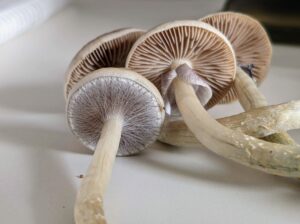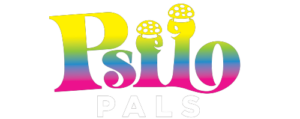Notable Elements
- Historical Significance: Psilocybin, used for centuries in spiritual practices by indigenous cultures, is now recognized for its potential mental health benefits.
- Chemical Composition: Psilocybin, found in over 200 mushroom species, converts into psilocin in the body, binding to serotonin receptors to produce psychoactive effects.
- Therapeutic Potential: Emerging research shows psilocybin’s promise in treating depression, anxiety, addiction, and PTSD, with long-lasting positive effects.
- Diverse Mental Health Applications: Clinical trials reveal significant benefits in treating various mental health conditions, offering new perspectives and treatment approaches.
- Legal and Research Developments: Increasing research and changing legal attitudes are promoting a better understanding and acceptance of psilocybin’s therapeutic use.
- Safety and Risks: While generally not addictive, psilocybin use does carry risks like psychological distress and physiological changes, necessitating controlled usage.
- Future of Mental Health Treatment: Psilocybin’s effectiveness in mental health treatment points to a potential paradigm shift in therapeutic practices.
Introduction
Psilocybin, the active compound found in magic mushrooms, has been used for centuries by indigenous cultures for its hallucinogenic and spiritual properties. However, recent scientific research has begun shedding light on the potential therapeutic benefits of this powerful compound. This article will explore the history, effects, and potent use of psilocybin as a healing compound, highlighting the current research and its applications in various mental health conditions.

History of Psilocybin Use
The use of psilocybin-containing mushrooms can be traced back thousands of years, with indigenous cultures in Mesoamerica, such as the Aztecs and the Mayans, incorporating them into their religious practices. Mushrooms were often consumed during spiritual ceremonies to induce altered consciousness and obtain spiritual insights.
In the modern era, psilocybin gained popularity during the 1950s and 1960s due to the work of researchers like Albert Hofmann and Timothy Leary. However, due to their association with counterculture movements and the lack of scientific evidence, these substances are classified as Schedule I drugs in many countries, limiting research and access.
The Chemical Composition and Mode of Action
Psilocybin, also known as 4-phosphoryloxy-N, N-dimethyltryptamine, is a naturally occurring compound found in over 200 species of mushrooms. Once ingested, psilocybin converts into psilocin, the compound responsible for the psychoactive effects.
Psilocin’s mode of action involves binding to serotonin receptors in the brain, primarily the 5-HT2A receptors. This interaction activates these receptors, leading to altered perception, increased introspection, and changes in emotions and cognition. These effects are responsible for the characteristic psychedelic experience associated with magic mushrooms.
Effects and Benefits of Psilocybin
The effects of psilocybin can vary greatly, depending on factors like dosage, individual susceptibility, and set and setting. Usual experiences include sensory alterations, synesthesia ( blending of senses), brooding thoughts, enhanced creativity, and a sense of connectedness to the universe.
While the recreational use of psilocybin mushrooms has been known for their mind-altering effects, recent research has focused on their potential therapeutic applications. Clinical studies have shown promising results in the treatment of various mental health conditions, including depression, anxiety, addiction, and post-traumatic stress disorder (PTSD).
- Depression:
Psilocybin may induce a state of heightened emotional openness and connectivity, allowing individuals to confront and process suppressed emotions. Clinical trials have significant reductions in depressive symptoms, with some suggesting that the effects can be long-lasting.
- Anxiety:
Psilocybin has also shown promise in the treatment of anxiety disorders, such as generalized anxiety and social anxiety. The compound’s ability to induce mystical experiences and increase feelings of connectedness is associated with a reduction in anxiety and fear of mortality.
- Addiction:
Studies have shown that psilocybin-assisted therapy can effectively reduce substance use disorders, including tobacco and alcohol addiction. The compound helps individuals gain new insights and perspectives on their addictive behaviors, leading to improved motivation and a higher success rate in overcoming addiction.
- PTSD:
Psilocybin is investigated as a potential treatment for PTSD, a condition characterized by intrusive memories, anxiety, and emotional numbness. Preliminary studies suggest that psilocybin therapy can help individuals process traumatic experiences and reduce symptoms, leading to improved quality of life.

Current Research and Legal Landscape
In recent years, there has been a resurgence of interest in psilocybin research, driven by the mounting evidence of its potential therapeutic benefits. Studies conducted at prestigious institutions, such as Johns Hopkins University and Imperial College London, have yielded groundbreaking results and have helped destigmatize the use of psilocybin in medical settings.
The legal landscape surrounding psilocybin is changing. In countries like the United States, decriminalization efforts have emerged, with several cities and states having passed or considered measures to reduce penalties for possession and cultivation. Canada and some European countries also have more relaxed attitudes towards psilocybin, allowing for research and medical use within specific frameworks.
Also Read : Understanding Psilocybin: Effects of Magic Mushrooms on Mood
FAQs- We thought you would ask!
- What is psilocybin and how does it work?
Psilocybin is a naturally occurring hallucinogenic chemical present in several mushroom species. It binds to the serotonin receptors in the brain, particularly the 5-HT2A receptors, leading to altered perception, thoughts, and emotions.
- What are the potential therapeutic uses of psilocybin?
There is growing evidence suggesting that psilocybin may have potential therapeutic uses. Studies have shown promising results in the treatment of depression, anxiety, obsessive-compulsive disorder (OCD), post-traumatic stress disorder (PTSD), addiction, and end-of-life distress in individuals with terminal illnesses.
- What are the risks and side effects associated with psilocybin use?
Psilocybin use carries certain risks and side effects. Psychological distress, bad trips, hallucinogen-persisting perception disorder (flashbacks), increased heart rate, blood pressure changes, and interactions with certain medications are all potential risks. Factors such as setting and set can influence psychological effects.
- Is psilocybin addictive?
Psilocybin is generally not considered addictive. It does not produce compulsive drug-seeking behavior or physical dependence that is characteristic of addictive substances like opioids or stimulants. However, psychological dependence or problematic use patterns can occur in some individuals.
- Can psilocybin be used to treat mental health disorders such as depression or anxiety?
Research suggests that psilocybin may hold potential in the treatment of mental health disorders such as depression, anxiety, and addiction. Clinical trials have shown promising results in reducing symptoms and improving overall well-being, although further research is needed to establish safety and efficacy.
- What ongoing research is being conducted on psilocybin and psychedelic therapy?
Ongoing research on psilocybin and psychedelic therapy is investigating its potential use in treating various mental health conditions. Studies are exploring its efficacy, safety, and mechanisms of action. Some research focuses on optimizing therapeutic protocols, while others investigate its effects on brain imaging, neurobiology, and long-term outcomes. The use of psilocybin-assisted therapy has been integrated into mainstream mental health care in several clinical trials.
Conclusion
Psilocybin, the healing compound found in magic mushrooms, offers tremendous potential for mental health treatment. Research is needed to better understand its therapeutic mechanisms and develop standardized protocols, but preliminary findings indicate its effectiveness in treating depression, anxiety, addiction, and post-traumatic stress disorder.
The recent resurgence of scientific interest and changing legal landscape suggest a promising future for psilocybin research and potential integration into mainstream medical practice.
As we continue to explore the healing properties of this ancient psychedelic compound, we may witness a paradigm shift in mental health treatment, offering hope to individuals suffering from debilitating conditions.
.

Hi! I’m Jacob Hawthorne, a passionate medical student dedicated to exploring the fascinating world of psychedelics, particularly magic mushrooms (commonly known as shrooms). With a deep interest in their therapeutic potential and profound effects on the human mind, I aim to provide accurate and evidence-based information about shrooms in the Canadian context.

